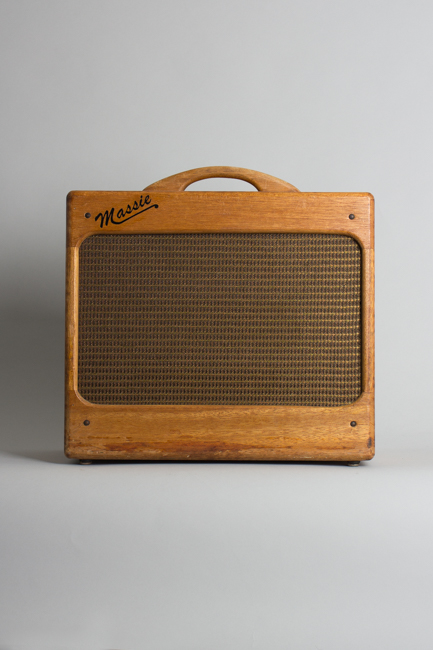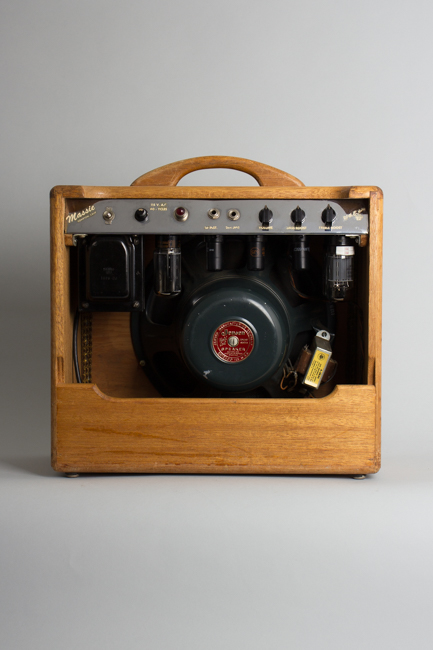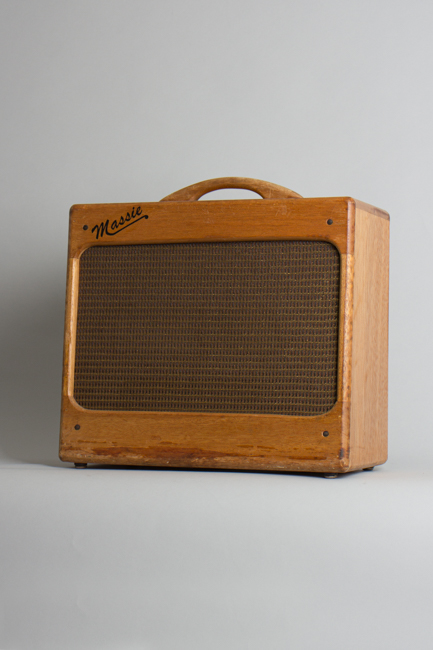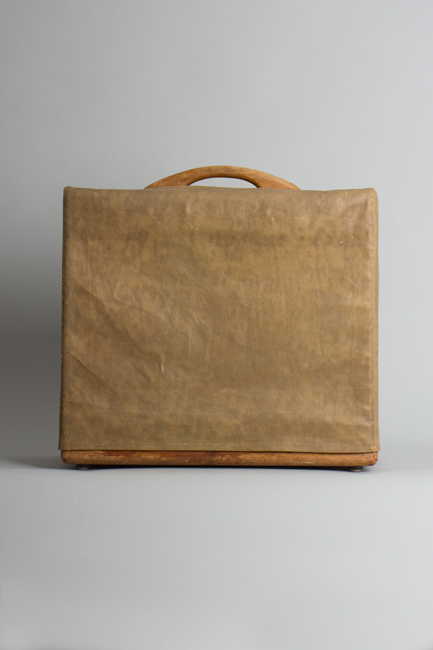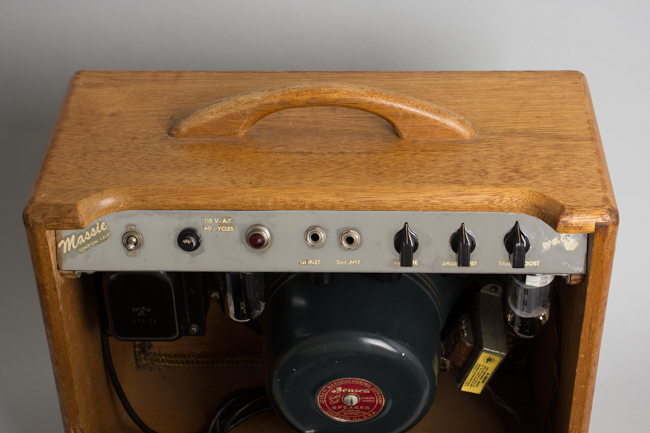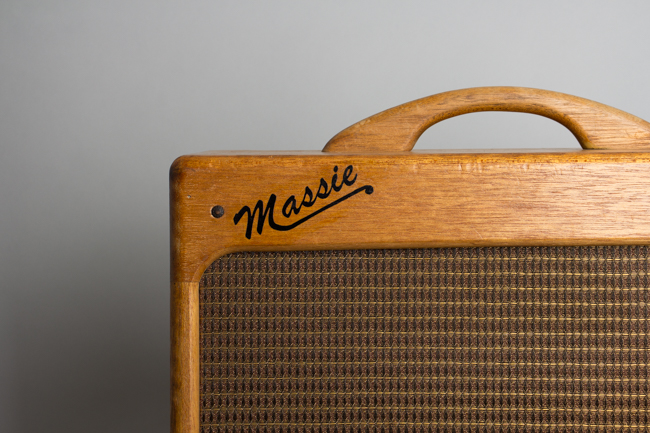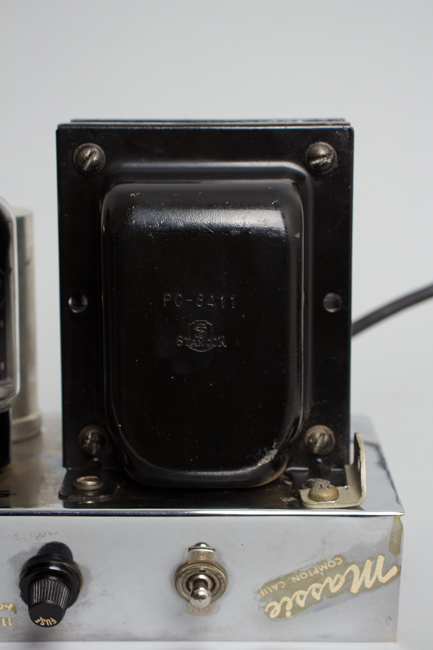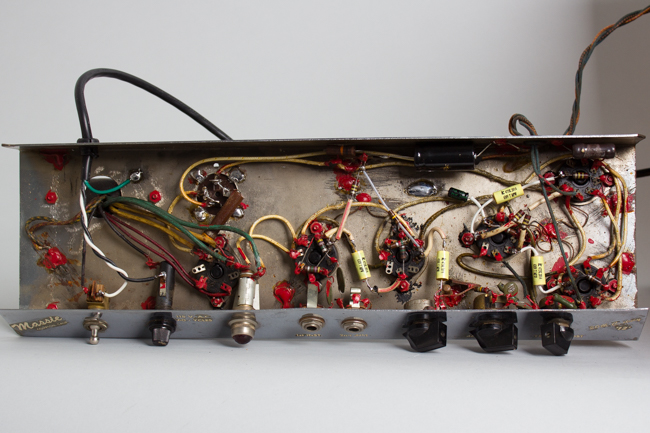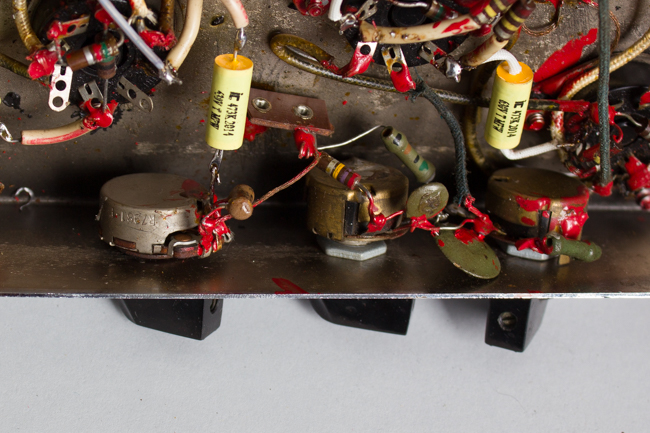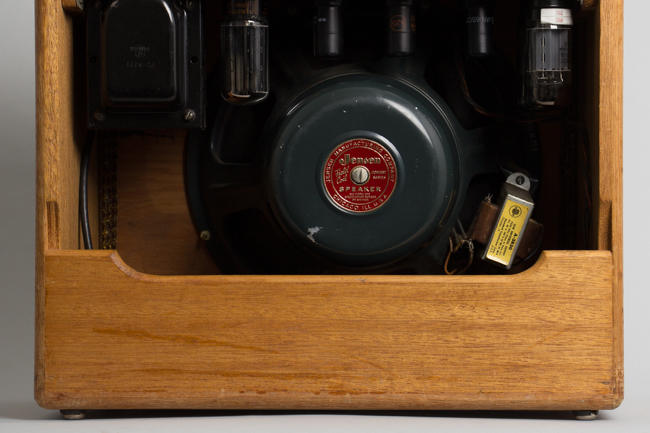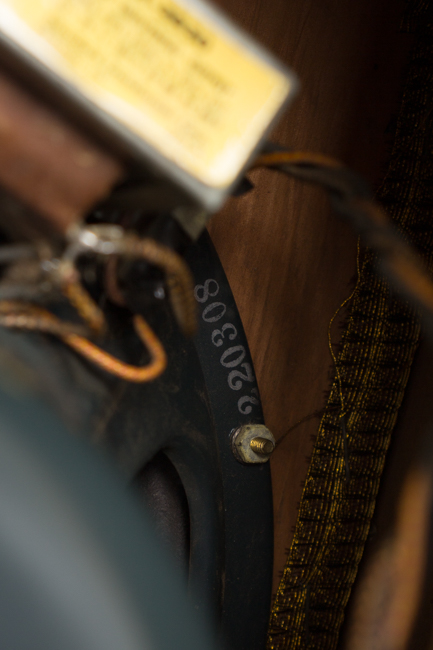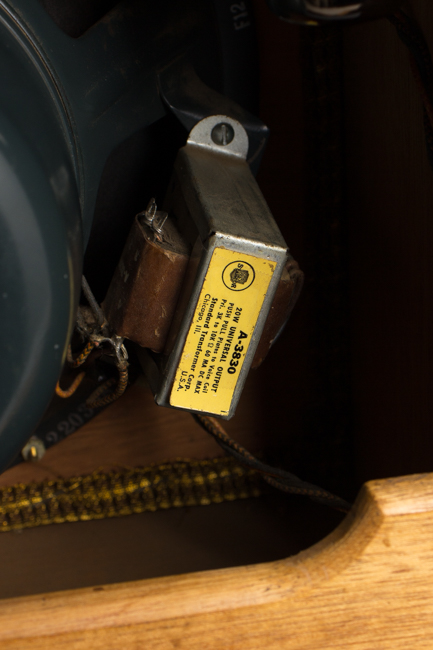Massie 20th Century 12 Tube Amplifier (1953)
Massie 20th Century 12 Model Tube Amplifier (1953), made in Compton, CA, natural wood finish.
We love the rare and unusual, but this is a first for our showroom: a "beyond rare" Massie model "20th Century 12" amplifier. Made in Compton, CA by former Fender amplifier co-designer Ray Massie, this is one of only a handful of his hand-built amps to ever be unearthed. Many amp connoisseurs consider this to be a "missing link" combo that Fender never made, featuring a dual 6L6 power section yielding around 45 watts of power into a single 12" high-rated Jensen field-coil. This is all housed in a compact solid wood cabinet clearly paying homage to the early Fender 'woodies' as well the 'TV-front' aesthetic of the more recent Fender line-up.
It appears only a very small batch of these were ever made, as only 4 (including this example) have so far ever been documented. While it bears no hand-written serial number anywhere to be seen, the components and construction are very close to another known Massie 20th Century 12 serial number #0009.
The design features two instrument inputs, a master volume and separate treble and bass controls, the latter of which Fender at the time only offered on their flagship Twin and Bandmaster models. Although appearing somewhat more hand-crafted than Fender amps of the day, the amp features a competent and beautiful design and sounds magnificent, not unlike an overpowered, super hi-fi incarnation of a 'Woodie' Model 26 Deluxe. Ray Massie was apparently never able to get off the ground commercially as a manufacturer, but the few amps he built are among the finest of their period, and by extension of all time!
Height is 15 1/2 in. (39.4 cm.), 17 3/4 in. (45.1 cm.) width, and 9 1/2 in. (24.1 cm.) in depth at deepest point.
Cosmetically, this amp is spectacularly well-preserved. The handmade wooden cabinet only shows some very minor signs of scuffing and wear, most of it towards the lower edges, but still retains its transparent finish and appears to mostly have been nicely protected by its original vinyl cover. The original 'gold-weave' grille cloth is spotless, taut with no notable tears or signs of fraying. The chrome plated control panel is in equally wonderful shape, retaining a near mirror-clean finish and still retaining all of the stenciled lettering, which show some discoloration around the edges of the text. The original wooden, 'woodie'-esque handle is present and the original vinyl cover as well.
Electrically, the amp is nicely original. The circuit and major components appear to be exactly as they were leaving Ray Massie's hands, and most solder joints still bear their red paint marking. The 12" F12N Jensen field coil speaker is original to the amp and bears the code 220-308, dating it to the 8th week of 1953. The speaker has been professionally reconed and both tests and sounds wonderful. Both the power and output transformers are original to the amp as well, bearing the codes PG-8411 and A-3830, the former made by Stan Cor and the latter by Standard Transformer Co. of Chicago, IL. All pots appear original as well. The amp has seen our typical maintenance and servicing, including replacement of all electrolytic capacitors, sockets, pots and jacks cleaned, a 3-prong power cord installed and biased to spec. Replaced components are included with the amp.
This incredibly rare piece is a highly important artifact with respect to Fender's history, a must have for the most serious Fender amplifier collector. Overall Excellent Condition.
We love the rare and unusual, but this is a first for our showroom: a "beyond rare" Massie model "20th Century 12" amplifier. Made in Compton, CA by former Fender amplifier co-designer Ray Massie, this is one of only a handful of his hand-built amps to ever be unearthed. Many amp connoisseurs consider this to be a "missing link" combo that Fender never made, featuring a dual 6L6 power section yielding around 45 watts of power into a single 12" high-rated Jensen field-coil. This is all housed in a compact solid wood cabinet clearly paying homage to the early Fender 'woodies' as well the 'TV-front' aesthetic of the more recent Fender line-up.
It appears only a very small batch of these were ever made, as only 4 (including this example) have so far ever been documented. While it bears no hand-written serial number anywhere to be seen, the components and construction are very close to another known Massie 20th Century 12 serial number #0009.
The design features two instrument inputs, a master volume and separate treble and bass controls, the latter of which Fender at the time only offered on their flagship Twin and Bandmaster models. Although appearing somewhat more hand-crafted than Fender amps of the day, the amp features a competent and beautiful design and sounds magnificent, not unlike an overpowered, super hi-fi incarnation of a 'Woodie' Model 26 Deluxe. Ray Massie was apparently never able to get off the ground commercially as a manufacturer, but the few amps he built are among the finest of their period, and by extension of all time!
Height is 15 1/2 in. (39.4 cm.), 17 3/4 in. (45.1 cm.) width, and 9 1/2 in. (24.1 cm.) in depth at deepest point.
Cosmetically, this amp is spectacularly well-preserved. The handmade wooden cabinet only shows some very minor signs of scuffing and wear, most of it towards the lower edges, but still retains its transparent finish and appears to mostly have been nicely protected by its original vinyl cover. The original 'gold-weave' grille cloth is spotless, taut with no notable tears or signs of fraying. The chrome plated control panel is in equally wonderful shape, retaining a near mirror-clean finish and still retaining all of the stenciled lettering, which show some discoloration around the edges of the text. The original wooden, 'woodie'-esque handle is present and the original vinyl cover as well.
Electrically, the amp is nicely original. The circuit and major components appear to be exactly as they were leaving Ray Massie's hands, and most solder joints still bear their red paint marking. The 12" F12N Jensen field coil speaker is original to the amp and bears the code 220-308, dating it to the 8th week of 1953. The speaker has been professionally reconed and both tests and sounds wonderful. Both the power and output transformers are original to the amp as well, bearing the codes PG-8411 and A-3830, the former made by Stan Cor and the latter by Standard Transformer Co. of Chicago, IL. All pots appear original as well. The amp has seen our typical maintenance and servicing, including replacement of all electrolytic capacitors, sockets, pots and jacks cleaned, a 3-prong power cord installed and biased to spec. Replaced components are included with the amp.
This incredibly rare piece is a highly important artifact with respect to Fender's history, a must have for the most serious Fender amplifier collector. Overall Excellent Condition.
